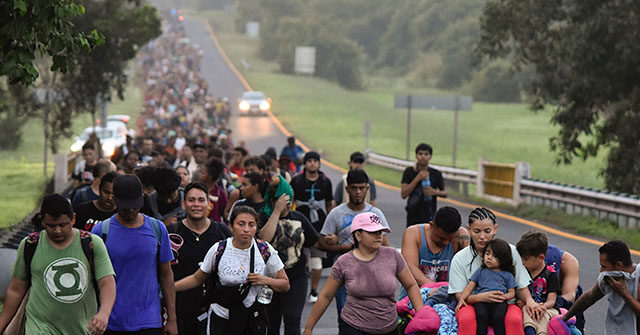A recent poll conducted by Midwest Newsroom and Emerson College Polling indicates that a majority of Kansas voters view mass migration negatively, despite the push from the business community for more migrants to fill low-wage jobs. According to the poll, 47% of respondents believe that the current administration’s immigration policies, particularly those of President Joe Biden and Vice President Kamala Harris, have adversely affected the state, while only 26% perceive a positive impact. This disparity underscores a significant divide in sentiment regarding migration within the state, reflecting broader national trends in political affiliations and their influence on immigration perspectives.
The poll highlights a stark divide between political party lines: 70% of Republican voters expressed negative opinions about mass migration, in stark contrast to the 60% of Democratic voters who felt it has had beneficial effects. This partisan division illustrates not only differing economic and social viewpoints but also reflects broader national conversations surrounding immigration policy and its implications on local economies. As conversations around migration become politically charged, this divide could shape future electoral outcomes and policy discussions in Kansas and beyond.
Among those who favor migration, voices like that of migrant Fabian Rosales showcase awareness and concern regarding public attitudes towards immigration. Rosales appreciates the economic contributions of immigrants but voiced his support for Donald Trump, citing better personal financial circumstances during Trump’s presidency. His perspective, blended with a desire for stricter immigration laws for criminals, reveals a complexity in voter sentiment that transcends simple pro- or anti-immigrant labels. This suggests that even among immigrants themselves, there can be a nuanced view of migration’s benefits versus the perceived challenges it brings to local communities.
Alejandro Rangel-Lopez, a representative of the migrant activist group New Frontiers, expressed dismay at the poll results, emphasizing that many respondents fail to understand the pivotal role migrants play in Kansas’s economy. He argues that without the contributions of immigrants, the state’s crucial sectors, particularly in low-wage manufacturing such as meat-packing, would struggle to maintain operations. Rangel-Lopez’s view stresses the importance of educating the public on the economic roles that migrants fulfill, which often go overlooked amid broader immigration debates.
Further complicating the discussion, a report from the Congressional Budget Office suggests that the influx of illegal immigration under the Biden administration could negatively impact American wages over the next decade. The report outlines projections indicating that an increase in population due to immigration will apply downward pressure on average real wages, potentially resulting in lower earnings for American workers by 2034. This finding reinforces concerns shared among some voters who view immigration as a factor in wage stagnation and economic disparity, positioning migration as a significant economic policy issue for Americans to grapple with.
The poll results were gathered from 1,000 registered voters in Kansas and neighboring states between September 26 and October 2, highlighting the relevance of public opinion in shaping immigration policy and addressing economic implications. With a margin of error of plus or minus 3 percent and a 95 percent confidence level, these findings provide a snapshot of Kansas voters’ sentiments regarding mass migration and underscore the ongoing complexities of immigration policy, economic impact, and community sentiments. This polarized debate reflects not only local attitudes but also mirrors national discussions regarding immigration’s role in shaping economic outcomes and influencing political landscapes.

